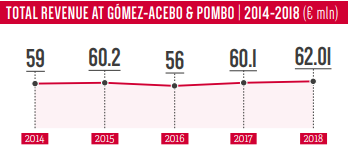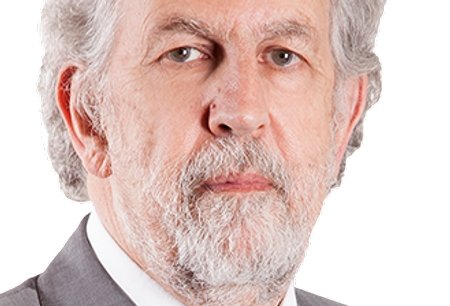Back on track

After a worrying drop in revenue three years ago, Gómez-Acebo & Pombo has reduced its number of partners, cut down on commoditised work, and increased its focus on value-added work – now it seems managing partner Carlos Rueda is steering the firm in the right direction
 The last three years have seen some turbulence at Gómez-Acebo & Pombo. Rewind to 2016, and the firm looked to be in trouble. It was a year in which it was the only one of Spain’s ten biggest independent firms to experience a drop in revenue. While Uría Menéndez and Garrigues, for example, reported revenue increases of 6 per cent and 3 per cent respectively in 2016, Gómez-Acebo & Pombo’s revenue fell an alarming 6 per cent. All in all, it was a difficult first year in charge for the firm’s managing partner Carlos Rueda. However, three years later, it appears that Rueda has made some significant progress and looks to have now set the firm on the right course. The firm’s revenue stood at €56 million in 2016, but, by 2018, this had grown to €62.01 million, which represents an 11 per cent increase.
The last three years have seen some turbulence at Gómez-Acebo & Pombo. Rewind to 2016, and the firm looked to be in trouble. It was a year in which it was the only one of Spain’s ten biggest independent firms to experience a drop in revenue. While Uría Menéndez and Garrigues, for example, reported revenue increases of 6 per cent and 3 per cent respectively in 2016, Gómez-Acebo & Pombo’s revenue fell an alarming 6 per cent. All in all, it was a difficult first year in charge for the firm’s managing partner Carlos Rueda. However, three years later, it appears that Rueda has made some significant progress and looks to have now set the firm on the right course. The firm’s revenue stood at €56 million in 2016, but, by 2018, this had grown to €62.01 million, which represents an 11 per cent increase.
However, bringing about a change in Gómez-Acebo & Pombo’s fortunes has involved a lot of hard work. With revenue at the firm on the slide, the firm had to make what Rueda describes as some “internal adjustments”. It’s an expression that appears to play down what have been some pretty dramatic changes at the firm. Perhaps the most obvious way in which the firm has altered is that the size of the partnership has been reduced by 12 per cent in the last two years – in 2017, the firm had 67 partners, but that number has been slimmed down to 59. One way in which the firm did this was by not always replacing partners who had retired. Rueda explains the change by saying that, while in the past the firm had some salaried partners, the policy now is to ensure that all new partners should be equity partners. “There is a strict policy on the appointment of new partners, they all have to be involved in the equity,” Rueda says.
PROFITABILITY GROWING
Now the outlook is brighter than it was three years ago. Revenue increased in 2017 and 2018 and further growth is expected this year. “The first semester of this year was better than last year,” he says. Rueda adds that he expects a third consecutive year of growth as well as an increase in profitability and efficiency. “Profitability is growing due to our leverage and utilisation rates,” Rueda explains. To give an indication of how the firm’s leverage has changed, while the number of partners at the firm dropped from 67 to 59 in the last two years, the total number of lawyers at the firm has stayed around the 275 mark. “The firm’s current leverage is correct,” says Rueda, implying that this had not necessarily been the case in the past.
Rueda says that, while there remains some pressure on fees, the firm has managed to increase its revenue and profitability by “moving away from commoditised work and focussing more on value-added work”. The firm has proved efficiency partly due to an enhanced focus on technology. “We created a new department and hired a manager focussed on digital transformation,” says Rueda. “We are using legal tech in our internal systems and standard tools for due diligence and drafting contracts.”
Rumours about law firms merging were flying around Madrid this summer, but Rueda says Gómez-Acebo & Pombo is committed to remaining an independent firm. “We are not considering an approach and there have been no discussions,” he adds. Some market observers say that Gómez-Acebo & Pombo doesn’t enjoy the same stature it did in years gone by and that is losing ground to competitors. However, Rueda argues: “We have a kept an excellent position in the market for high-end quality work, we still do quality work.” Around 40 to 45 per cent of Gómez-Acebo’s revenue is generated from clients based in jurisdictions other than Spain. “We get a lot of referral work,” Rueda says.
LISBON OFFICE GROWING
Gómez-Acebo & Pombo views itself as an Iberian firm and Rueda very much embodies this ethos. Prior to becoming managing partner of the entire firm in 2016, Rueda was managing partner of the firm’s Lisbon office for just over a year. The Lisbon office, along with the firm’s office in Barcelona, is now the firm’s joint-second biggest office – revenue grew by around 30 per cent in 2018. Though the firm does not publish an official figure for the revenue of its Lisbon office, it is believed to be around €6.6 million. Rueda says the Portuguese office has grown, in part, because of the country’s growing economy. He adds: “There is still room to grow further, we believe in the concept of an Iberian firm.” Rueda says he expects the Lisbon office to grow further and highlights the appointment of Mafalda Barreto as managing partner of the office at the beginning of last year as evidence of significant progress. Barreto is the first Portuguese managing partner Gómez-Acebo & Pombo’s Lisbon office has had and suggests that the operation is finally finding its feet and becoming less reliant on the firm’s head office in Madrid.
MARKET RUMOURS
The energy, new technology and real estate sectors will be key drivers of growth at the firm in the coming year, according to Rueda. He adds: “M&A was very good last year, though this year there have been fewer enormous transactions.” Rueda believes there will be few major changes in the Spanish legal market, though he thinks there will be more market segmentation in the sense that firms will increasingly be choosing to focus on a particular type of work, whether that be high-end value-added work or commoditised work. Rueda doubts that there will be any big mergers involving the major Spanish law firms, though he says there could be more mergers involving international firms and Spanish mid-market players. Rumours persist about US firms opening in the Spanish market, but Rueda says such a move can be challenging for those involved. “It can be difficult to build a tier one, full-service firm,” he adds.

To read the article in full please download issue N.87 here












